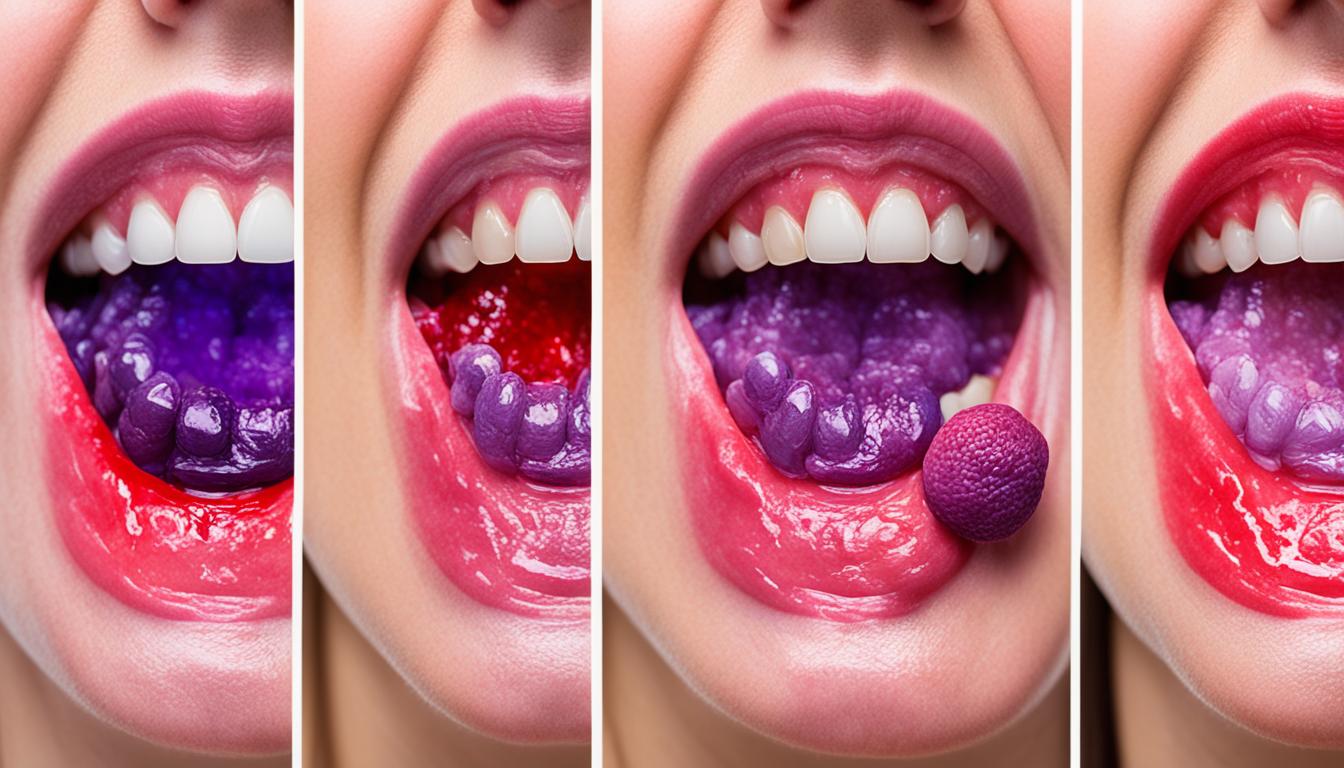Recurrent oral ulcers are often called canker sores. They are painful sores inside the mouth and lips. These sores can cause minor pain or more severe problems.
They may affect how you eat, drink, talk, swallow, and breathe. The causes include genetics, issues with the immune system, stress, and certain medicines.
Diagnosing these ulcers is mainly through symptoms and a check-up. Although they can’t be fully cured, treatments help manage the pain and heal the sores.
Stem cell therapy is a new treatment that uses stem cells to fix damaged tissues. It aims to grow new, healthy tissues in the mouth. Early tests show it might offer a better way to deal with oral ulcers in the future.
Key Takeaways:
- Recurrent oral ulcers, also known as canker sores or aphthous ulcers, are painful sores that develop inside the mouth and lips.
- They can range from minor irritations to more severe complications, affecting eating, drinking, talking, swallowing, and breathing.
- Causes of recurrent oral ulcers include genetics, immune system dysfunction, stress, hormonal changes, and certain medications.
- Diagnosis is usually based on symptoms and physical examination.
- Stem cell therapy shows promise in repairing damaged tissues and promoting the regeneration of healthy oral mucosa.
Symptoms of Recurrent Oral Ulcers
Recurrent oral ulcers, or mouth sores, vary in symptoms. Knowing signs early is key to treatment. Symptoms depend on how severe the ulcers are and the person.
Here are common signs of these ulcers:
- Painful sores on the mouth’s inside or lips.
- Sores shaped like rounds or ovals, with a white or yellowish-gray cover.
- Ulcers come in different sizes, some small and shallow, others large and deep.
- Feeling a burn or tingle before sores show up.
- Trouble eating or drinking due to pain.
- Feeling sensitivity to spicy or acidic foods.
- Having swollen lymph nodes in the neck.
Recurrent oral ulcers might come with tiredness, fever, and body pain. Always get help if the symptoms last or are severe. Seeking medical advice for the right care is crucial.
Causes and Risk Factors of Recurrent Oral Ulcers
Recurrent oral ulcers, or canker sores, happen due to many reasons. Lots of things can cause these painful sores in the mouth.
Genetics is a big part of why some people get these ulcers often. If your family has a history of mouth sores, you might get them too.
A weak immune system can also lead to these ulcers. If your body can’t fight off inflammation in your mouth, ulcers form.
Stress is a common trigger for mouth ulcers. When you’re very stressed, your immune system doesn’t work as well, making sores more likely.
Changes in hormones, like during a woman’s period or pregnancy, can play a role. These changes can make your mouth more vulnerable to ulcers.
Some medications, including NSAIDs and beta-blockers, are linked to mouth ulcers too. They can cause your mouth to become inflamed, leading to sores.
If you accidentally bite the inside of your cheek, it can also start an ulcer. This damages the spot, which can then turn into a painful sore.
Not getting enough key nutrients, like vitamin B12, iron, or folic acid, increases ulcer risk. Eating a healthy, balanced diet is essential to avoid these sores.
Knowing about and dealing with these risk factors can lower how often you get mouth ulcers. This is good for your oral health and how you feel in general.
| Causes | Risk Factors |
|---|---|
| Genetics | Familial history of oral lesions |
| Immune system dysfunction | Compromised immune response |
| Stress | High levels of stress |
| Hormonal changes | Menstruation, pregnancy |
| Certain medications | NSAIDs, beta-blockers |
| Trauma to the mouth | Accidental biting |
| Nutritional deficiencies | Vitamin B12, iron, folic acid deficiencies |
Stem Cell Therapy for Recurrent Oral Ulcers
Recurrent oral ulcers, known as canker sores, can greatly hurt and affect oral health. Typical treatments help briefly, but stem cell therapy might lead to lasting improvement.
Stem cells have special abilities to change into different cell kinds and help in making tissue anew. For oral ulcers that keep coming back, stem cell therapy tries to mend the hurt tissues in the mouth and aid in healing.
The way stem cells help is not fully clear yet. It’s thought they make the body’s healing work better and adjust the immune system. This could decrease swelling and help fix tissues. Early tests show stem cell therapy can be helpful. People felt better, their sores healed more quickly, and the healing process improved.
We still need more proof that stem cell therapy for oral ulcers is both safe and lasting. More study and making the treatment better is needed. But, this new approach gives hope to those wanting to improve how they deal with recurrent oral ulcers. It may lead to a better life quality.

